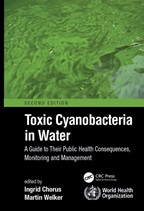Microcystins
Microcystins are considered in the WHO Guidelines for Drinking-water Quality (GDWQ).
For individual chemicals, the GDWQ also consider:
Previous editions of the background document
For the 1998 background document, see Guidelines for drinking-water quality, 2nd ed. Vol. 2. Addendum (1998)
Chemical hazards in drinking water
Other publications of interest

Protecting surface water for health: Identifying, assessing and managing drinking-water quality risks...
Protecting surface water for health provides a structured approach to understanding surface waters and their catchments to support the identification,...

This book provides guidance on the chemical safety of drinking-water. Chemical contaminants of drinking-water are often considered a lower priority than...

Toxic cyanobacteria in water - Second edition
Cyanobacterial toxins are among the most hazardous substances, widely found in waterbodies. They occur naturally, but human activity influences the extent...
